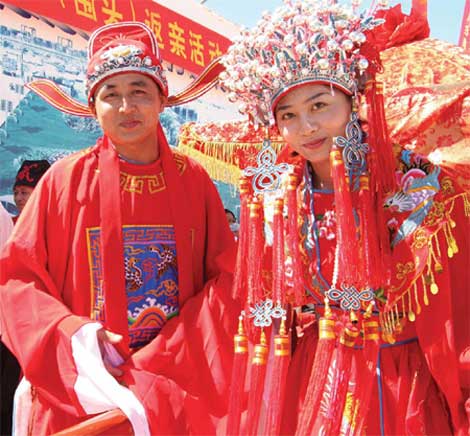My Chinese Valentine
Updated: 2011-08-05 11:35
By Zhang Xi (China Daily European Weekly)
 |
|
A married couple, in traditional costume, retake their marriage vows on Qiqi festival day in Fuzhou, Fujian province, last year. Lin Liangbiao / for China Daily |
Local businesses are cashing in on a traditional love story involving a cow herder and a goddess
As Chinese Valentine's Day beckons, hotels, shops, restaurants, florists and even marriage registrars are gearing up to cope with booming business.
This year the Qixi Festival (or Chinese Valentine's Day) falls on August 6, which is the seventh day of the seventh lunar month.
Based on a legendary love story, it was traditionally a day when young, single women demonstrated their domestic arts skills and wished for a good husband.
Today it is a time to flash the cash for the one you love.
"I will buy my girlfriend a bunch of flowers and have a nice dinner with her at a luxury restaurant that evening," says Xiang Jun, a 32-year-old IT worker in Beijing. "Actually, our ritual is quite similar to the Western Valentine's Day."
Xiang's Chinese Valentine's Day's plans are good news for high-end hotels, like Beijing's five-star Sofitel, which is offering a special dinner menu for lovers that night.
Florists, too, are expecting a windfall in the lead-up to the big day.
Online florist Le Flower says more than 1,000 bunches of flowers have been pre-booked nationwide for Qixi, which is up 10 percent more than the same period last year.
But a company spokesperson says the real peak sales time will come a day or two before Qixi. Last year the store sold more than 7,000 bunches.
Many couples want to take their romance to the next level and choose to marry on Qixi to make their big day extra special.
"The situation is most likely as the same as last year," says a marriage registration office spokesperson, from the Chaoyang district of Beijing. "We have had more than 100 online registrations for that day but there will be certainly more."
Last year about 600 couples registered for marriage on Qixi at the Chaoyang office and 18 offices in different districts around Beijing experienced similar high numbers.
"We may receive the notice soon to work overtime that day to meet the high requirement just as we did last year. It is a peak time," the spokesperson says.
Some tourism centers in China, such as Xi'an, Fuzhou and Beijing, will hold special Qixi ceremonies and couples will wear traditional Chinese costumes to remember the old legend.
As the story goes, once there was a cowherder called Niulang, who was forced to stop living with his elder brother and sister-in-law because of her abuse.
He was only left with an old cow that was actually a former god who had violated the rules of heaven and had been cast down to earth in bovine form.
The cow wanted his kind master to have a happy life so led him to a lake where seven goddesses had come to take a bath.
Niulang fell in love with the youngest goddess, Zhinu, at first sight.
Zhinu, a skilled seamstress and weaving maid, liked her admirer so she did not go back to heaven and married Niulang. They lived a happy life and had a son and a daughter.
But all was not well.
In the eyes of the Emperor of Heaven, marriage between a mortal and a goddess was strictly forbidden so he sent his wife to fetch Zhinu.
Niulang soon discovered his wife had been taken, and with the help of the old cow, flew up into the heavens to rescue his wife from the Empress.
The Empress was angered by Niulang so she used her hairpin to slash the sky and create the Milky Way in an effort to block their pursuit.
A tiding of magpies had been watching all the action and was moved by their love and devotion.
They formed a bridge across the Milky Way to help the family reunite.
Even the Emperor of Heaven was touched, and allowed Niulang and Zhinu to meet once a year on the seventh night of the seventh lunar month.
Young Chinese think Qixi is a traditional festival designed for lovers, but Gao Wei, secretary-general of the Beijing Folklore Society, says the Qixi story started in the Han Dynasty (206 BC-AD 220) and was a symbolic fable for women.
"Its date, the seventh day of the seventh lunar month, implies the importance of the number seven for women in ancient times," he says.
"Girls start to have their hair bound to indicate their gender at the age of 7; teenage girls begin their menstral cycle when they are 14 years old and at 49, women are menopausal."
Traditionally, Chinese have always paid a lot of attention to family prosperity, and believe the more children a family had, the more prosperous the family would be.
Children were considered the strongest bonds of a couple.
"Therefore, Qixi was also known as the Festival to Plead for Skills," he says.
"In ancient times, there were only three goals for a female. One, to be a good daughter, two, a good wife, three to be a good mother.
"And her handcraft ability was a very important element to reach these goals."
Thousands of years ago, on the night of Qixi, when the star Vega (or the Weaving Maid star in Chinese), was high in the sky, unmarried women performed a test by carefully putting a needle on the water's surface.
If the needle floated, it was a sign of a girl's maturity, and indicated she was eligible to find a husband.
It was also a tradition for young girls to demonstrate their domestic skills, especially to be able show they could thread a needle in the moonlight.
Social commentators say the basic "home-maker" concept of Qixi has been hidden behind chocolates, flowers and commercialism.
Cui Puquan, another folklore expert in Beijing, says the government and society needs to do more to promote the culture behind the important Chinese tradition.
"Women in modern society still should learn domestic skills and perform their proper roles in the family," he says.
"We need to educate them to know more about the ritual of Qixi and understand the responsibility of being a wife and a mother.
"Qixi was initially celebrated among women.
"There were no flowers, or chocolates. Boys and men were relatively unacquainted with it long ago."
E-paper

Double vision
Prosperous Hangzhou banks on creative energies to bridge traditional and modern sectors
Lifting the veil
Allure of mystery
Outdoor success
Specials

Ancient plate broken
An ancient porcelain plate was accidentally destroyed during a research in the Palace Museum.

Selfless actions
A 20-year-old girl becomes an Internet star for giving her first kiss to a drowning old man.

Space race
Homebuyers are learning the hard facts of supply and demand: too many cars and too few parking spaces.
